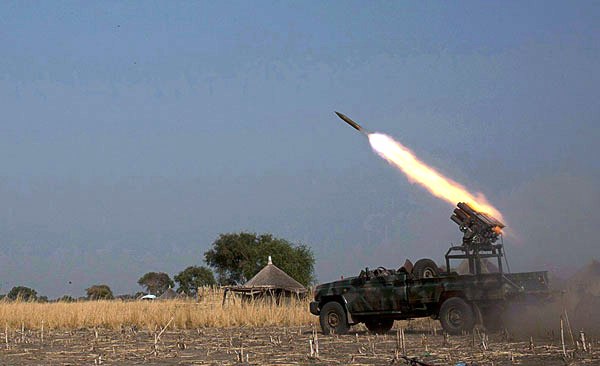South Sudan reject arms embargo, says undermines sovereignty

July 12, 2016 (JUBA) – South Sudanese government has rejected a global proposal seeking consensus to impose an arms embargo on the young nation, questioning the intention behind the advocacy.
“What is the reason for these sanctions? The president is fully committed to implementing the peace agreement. The rebel leader Riek Machar has returned and the transitional government of national unity has been formed,” explained South Sudanese ambassador to neighbouring country of Kenya.
Ambassador Chol Mawut Unguec Ajonga, argued that the arms embargo would reduce the Sudan People’s Liberation Army (SPLA), the official army of South Sudan, to carrying “only sticks.”
“What do they want? Do they want our national army to carry only sticks,” he asked in an interview with the London based British Broadcasting Corporation (BBC) on Monday on the situation in the country.
FAILED LEADERSHIP
The diplomat was reacting to reports quoting the secretary general of the United Nations, Ban Ki Moon, who described the situation in South Sudan as a result of a failed leadership in the country.
Ki Moon called on the global community to take immediate action on the situation in South Sudan to avert more disaster, asserting there was no other moment to waste
“The renewed fighting is outrageous. It is yet another grievous setback. It deepens the country’s suffering. It makes a mockery of commitments to peace,” said Ban Ki-moon, UN secretary general at an address to the UN Security Council on South Sudan on Monday.
The head of the world body told members of the Security Council on that many people have been killed in the four days of heavy fighting and there are growing fears that many more could die in another round of violence.
He expressed condolences to the families and loved ones of all those who have been killed in the fighting that has consumed Juba and condemned the killing of two Chinese peacekeepers and one UN national staff.
“I am appalled by these indiscriminate attacks on civilians and peacekeepers. The two UNMISS compounds in Juba have been caught in the cross-fire and sustained mortar and heavy artillery fire. At least two internally displaced persons have been killed in the UNMISS protection of civilians sites, and some 35 injured,” Ki-moon said in a statement.
Thousands of civilians have fled to various locations in the town, including the two UNMISS compounds.
The UN chief particularly blamed the leaders of South Sudan for having failed their people and squandered much of the promise to return the country to normalcy.
“Rarely has a country squandered so much promise, so quickly. What kind of leadership is it that resorts to deadly weapons and identity politics, time and again? Failed leadership,” he stressed.
He said his message to President Salva Kiir and First Vice-President Riek Machar was clear, asking them to do everything in their power to de-escalate the hostilities immediately and order their respective forces to withdraw to their bases.
“Let me underscore, again, to all those leading and perpetrating these hostilities that acts of violence perpetrated against civilians and United Nations and humanitarian personnel, assets and premises may constitute a war crime. There must and will be accountability for the atrocities that have been committed in South Sudan since 2013. It is not just leaders who must face a reckoning, but all those in the chain of command, including chiefs of staff and other officials complicit in the violence,” he said.
The international community, he added, through its wide-ranging security, legal and human rights mechanisms, will be carefully monitoring developments in the coming days precisely in order to be able to identify on whom the burden of accountability for war crimes should ultimately be placed.
(ST)
